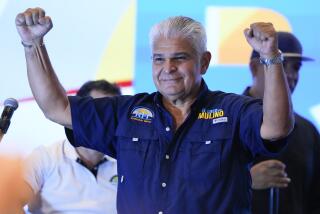Getting Noriega Out
- Share via
Today was to have been the day Panama celebrated the return of genuine democracy--the day a new president popularly elected last May 7 was to be inaugurated. Instead, Panamanians will mark this date facing the grim reality that their country is still controlled by a thug, Gen. Manuel Antonio Noriega.
Noriega tried to steal the May election for his hand-picked candidate, then annulled the electoral process when it became apparent he could not produce enough phony votes to outweigh the support his opponents received. Noriega’s supporters then began attacking his opponents, who took to the streets in peaceful protest against the electoral fraud. It looked for a time as if the international outcry that followed those bloody beatings would finally lead Noriega to give up power. But four months later that hasn’t happened. Noriega’s foreign critics did not know how patient and cunning he could be.
This week the general began the process of selecting puppets who will fill posts in an interim government. They will take office today, and will keep him in the pivotal post of commander of Panama’s military, the most powerful institution in the country.
For two years President Reagan tried to pressure Noriega by using economic sanctions that badly damaged the Panamanian economy. President Bush extended Reagan’s unsuccessful strategy, with one notable exception. After the May elections were nullified, Bush wisely called on the Organization of American States to mediate the political crisis in Panama, but it botched the job. A four-member OAS commission sent to Panama barely spent any time in the country and allowed Noriega to bog it down debating legal technicalities. Last week the commission issued an inconclusive report insisting it needed more time to make more progress.
Frustrated OAS diplomats also pointed an accusing finger at the United States, claiming that U.S. military commanders in the Canal Zone did not make things any easier for the mediators by continually ordering their troops into armed standoffs with the Panamanian Defense Forces. Their point is well taken. At a time when Bush insists that this country’s argument is with Noriega and not the defense forces, it seems contradictory and even foolhardy for U.S. forces to stand toe-to-toe with Panamanian soldiers, as has happened several times in the last few weeks. Even the slightest U.S. military action carries negative overtones in Latin America, and especially in Panama. It makes Noriega look like a nationalist standing up to the gringo bully--the only stance in which he can win.
That is why Bush must now resist calls for even tougher sanctions against Panama, such as threats to abrogate the Panama Canal treaties or to use military force against Noriega. Force would surely get rid of Noriega, but it would create other problems throughout Latin America. It was reassuring that Bush said Thursday that he intends to continue applying multilateral diplomatic pressure on Noriega. But this time, it must be pursued more firmly and consistently than the OAS did in the first go-round.
Rather than negotiating with the dictator, the OAS should put a permanent human-rights team in Panama to document whatever repressive measures Noriega uses to keep dissatisfaction with his rule from boiling over. That team would provide the bill of particulars that can be used to further isolate Noriega, as surely as other international pariahs like Libya and Iran are isolated. It would keep diplomatic pressure on the dictator until he again oversteps the bounds of decency, as he did in May. Then the campaign to oust him can be renewed with greater vigor. Until then, however, Noriega’s opponents will have to display the same patience and cunning that he has shown these last few months. Waiting Noriega out won’t be pleasant or easy. But given his past crudeness and brutality, Noriega will surely make the mistake that helps bring him down.
More to Read
Sign up for Essential California
The most important California stories and recommendations in your inbox every morning.
You may occasionally receive promotional content from the Los Angeles Times.









